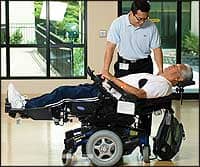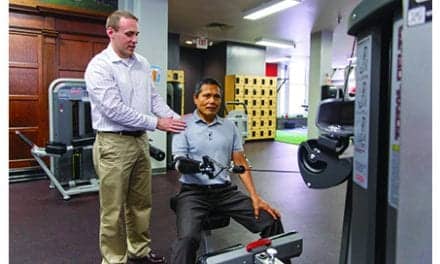Two Veterans Affairs scientists were recently recognized for their work in spinal cord injuries (SCIs) with the Samuel J. Heyman Science and Environment Medal, also known as the “Sammies.” William A. Bauman, MD, and Ann M. Spungen, PhD, director and associate director of VA’s Rehabilitation Research & Development National Center of Excellence for the Medical Consequences of Spinal Cord Injury received the awards September 22, according a VA news release.
The Science and Environment Medal is given to federal employees who have made a significant contribution to the nation. The VA researchers have been working together for a quarter of a century, the release says, and were recognized in a ceremony in the Andrew Mellon Auditorium in Washington, DC. VA Secretary Robert McDonald presented the awards to Bauman and Spungen.
The release reports that in 2001 Bauman and Spungen established the VA’s Rehabilitation Research & Development National Center of Excellence for the Medical Consequences of Spinal Cord Injury in Bronx, NY. It was at this location that Spungen most recently tested a new bionic walking assistance system built to allow individuals with paralysis to stand, walk, and climb stairs.
The collaboration between the scientists has allowed them to make progress in understanding the impact of SCI on the body, and also led to the conclusion that SCI patients face a markedly increased risk of heart disease. The release notes that the two were also the first to describe, and then treat an asthma-like lung condition common in patients with higher levels of paralysis. Bauman and Spungen have also developed strategies intended to make it easier for paralyzed patients to undergo successful colonoscopies.
Additionally, alongside other researchers in their unit, Bauman and Spungen reportedly formulated novel drug combinations to raise low blood pressure, and they have overseen the development of treatments designed to reduce bone loss shortly after SCI. Their work, the release adds, has helped advance understanding and treatment of chronic, non-healing pressure ulcers. Under their direction, researchers are also working toward improving understanding of body temperature regulation and the impact of swings in body temperature on an individual’s ability to think.
The release reports that Bauman has worked at the Bronx VA hospital for 35 years, and says he decided from the start to devote himself to SCI patients.
“I would say our center’s greatest accomplishment has been to identify problems in persons with spinal cord injury that no one had appreciated prior to our work, and then to develop successful approaches to solve them,” Bauman says. He adds that prior to their work, many of these issues were not realized to be important or were ignored, as it appeared nothing could be done to improve them.
In the release, Spungen emphasizes her captivation of Bauman’s sense of civic duty, and that of all the scientists and investigators at the VA, “I got to the VA and met these incredible scientists and investigators who were here working for the Veterans and who were so intelligent, so open, and so kind. I just became enamored with the entire atmosphere and dug in, and I have been here ever since,”
The pair’s work has had a far reaching impact, according to Robert Ruff, national director for neurology at the VA, “The research is relevant not only to people with spinal cord injury, but to a larger population who are immobilized, from those with ALS to cancers, muscular dystrophy, multiple sclerosis, dementia or Parkinson’s disease,” Ruff notes.
Source: VA





